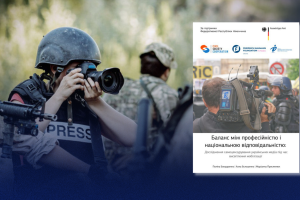The survey was conducted by the sociological service of the Razumkov Center jointly with the Ilko Kucheriv Democratic Initiatives Foundation from July 3 to 9, 2020, via face-to-face interviews at the respondents’ place of residence. 2022 respondents aged over 18 y.o. were interviewed in all regions of Ukraine, except for Crimea and the occupied territories of Donetsk and Luhansk oblasts, according to a sample representative of the adult population according to the key socio-demographic indicators. The theoretical sampling error (excluding the design effect) does not exceed 2.3% with a probability of 0.95. The survey was funded as part of the MATRA project of the Embassy of the Kingdom of the Netherlands.
The press conference “EDUCATION AND THE PANDEMIC: the attitudes of Ukrainians towards distance learning and External Independent Testing” is conducted by the Ilko Kucheriv Democratic Initiatives Foundation as a part of USAID/ENGAGE activity, which is funded by the United States Agency for International Development (USAID) and implemented by Pact in Ukraine. The contents of the event are the sole responsibility of Pact and its partners and do not necessarily reflect the views of the United States Agency for International Development (USAID) or the United States government.
Results
- The majority of Ukrainians evaluate the quality of school education in Ukraine as average (44.5%); 10% - give a positive evaluation. A third of citizens consider it either extremely low (11%) or rather low (22%). The majority of skeptical responses come from the Eastern region, and most positive responses come from the Western region.
- The majority of Ukrainians agree that there is a need to improve the quality of secondary education in Ukraine. 34% believe that tackling this issue should be a priority, and 48% think that the issue is important, but Ukraine is facing more serious challenges in other areas.
- About half of Ukrainians do not approve of the implementation of distance learning in the wake of the pandemic; 32% support this initiative. The Southern (29%) and Eastern (28%) regions have a higher proportion of those who extremely disapprove of the initiative.
- The most pressing problems that Ukrainians are facing due to distance learning are the decreasing success rate of students (22%) and technical issues: poor Internet quality (21%) and the lack or absence of devices for online learning (19%). The lack of devices is a problem that is especially acute in cities with the population under 100 thousand (20-30%).
- Most Ukrainians believe that the Ministry of Education and Science bears the responsibility for the quality of education and the administration of schools during the pandemic; 11% believe that the President of Ukraine should be responsible for this process.
- 67% of Ukrainians support the External Independent Testing (EIT) initiative introduced in 2008 as an integral part of the college application process. Only 14% are against it. As far as the reasons for the support of EIT are concerned, 70% of citizens agree that EIT equalized all applicants; 60% believe that EIT decreased the level of corruption during the college application process. This belief is prevalent across all regions, but about 28% of the residents of Eastern and Southern regions don’t believe that EIT decreased the level of corruption.
- 61% of citizens believe that the experience of managing an educational institution is an important quality for Ukraine’s Minister of Education. Among other qualities, 50% list the experience of teaching at an educational institution, 47% mention solid professional reputation and lack of academic misconduct, 39% mention honesty (the lack of discrepancy between income and assets/lifestyle). 35% stress the importance of trust from the academic community – teachers, professors, heads of schools, rectors, and other people employed in the sphere of education and science.
Results
- How would you evaluate the quality of education in Ukraine?
| December 2014 | December 2015 | December 2016 | July 2020 |
Extremely low | 8,0 | 5,5 | 6,1 | 11,0 |
Rather low | 21,9 | 21,5 | 22,3 | 25,4 |
Average | 50,2 | 57,2 | 53,7 | 44,5 |
Rather high | 11,7 | 10,7 | 11,0 | 9,7 |
Very high | 2,2 | 1,2 | 0,7 | 0,4 |
Difficult to answer | 6,1 | 3,8 | 6,2 | 8,9 |
18-29 y.o. | 30-39 y.o. | 40-49 y.o | 50-59 y.o. | 60 y.o. and older | |
Extremely low | 8,0 | 11,3 | 11,0 | 12,3 | 12,5 |
Rather low | 23,2 | 25,7 | 24,6 | 26,4 | 26,9 |
Average | 51,6 | 47,9 | 47,1 | 45,0 | 34,3 |
Rather high | 11,8 | 8,2 | 10,2 | 7,7 | 10,2 |
Very high | 0,3 | 0,6 | 0,0 | 0,6 | 0,4 |
Difficult to answer | 5,1 | 6,2 | 7,1 | 8,0 | 15,8 |
- How important do you believe it is to improve the quality of secondary education in Ukraine?
- What is your attitude towards the implementation of distance learning in schools due to the COVID-19 (coronavirus) pandemic in March-May 2020?
Strongly supportive | 9,9 |
Rather supportive | 22,4 |
Rather unsupportive | 25,1 |
Strongly unsupportive | 24,6 |
Difficult to answer | 18,0 |
- Which problems has your family faced during the distance learning due to the COVID-19 (coronavirus) pandemic in March-May 2020?
Decreasing success rate of students | 26,1 |
Lack of attention by teachers with regards to the needs of children | 21,6 |
Lack of access or the absence of devices (computers, tablets, etc.) for students to take part in online classes | 19,0 |
Poor Internet quality | 21,3 |
Excessive student workload | 13,3 |
Insufficient student workload | 5,0 |
Formal attitude of teachers with regards to distance learning (lack of accommodation) | 16,1 |
Other | 2,0 |
No issues due to distance learning | 5,5 |
These issues do not concern my family (no children, children don’t go to school, etc.) | 42,1 |
Difficult to answer | 3,4 |
City (>1 million) | City (100-999 thous.) | City (50-99 thous.) | City (20-49 thous.) | City (<20 thous.) | Urban-type settlement | Village | |
Decreasing success rate of students | 15,3 | 22,5 | 29,5 | 36,4 | 28,9 | 30 | 29,5 |
Lack of access or the absence of devices (computers tablets, etc.) for students to take part in online classes | 8,9 | 14 | 26,4 | 40,9 | 27,9 | 19,6 | 20,0 |
Poor Internet quality | 7,2 | 12,6 | 20 | 39,1 | 34,5 | 25,8 | 27,1 |
- Who do you believe is responsible for the quality of education and the administration of schools during the COVID-19 pandemic?
President | 11,1 |
Verkhovna Rada | 3,7 |
Cabinet of Ministers | 8,5 |
Ministry of Education and Science | 56,6 |
Local governmental administrations | 3,6 |
Local radas and mayors | 1,7 |
Pedagogues | 5,9 |
NGOs | 0,2 |
Parents | 2,1 |
Business | 0 |
Other | 0,3 |
Difficult to answer | 6,3 |
- Since 2008 the External Independent Testing has been a key criterion for the selection of students as part of the college application process. Do you support EIT as part of the application process?
- Do you agree with the statement that EIT equalizes all students?
| October 2013 | December 2014 | December 2015 | December 2016 | July 2020 |
Completely agree | 12,0 | 20,3 | 19,2 | 17,3 | 29,1 |
Mostly agree | 44,4 | 41,9 | 44,2 | 45,3 | 39,5 |
Mostly disagree | 16,6 | 14,7 | 15,1 | 15,8 | 10,1 |
Completely disagree | 8,5 | 6,5 | 7,2 | 5,7 | 4,1 |
Difficult to answer | 18,4 | 16,5 | 14,3 | 16,0 | 17,1 |
West | Center | South | East | |
Completely agree | 46,4 | 27,2 | 14,9 | 22,9 |
Mostly agree | 37,9 | 42,9 | 44,1 | 34,0 |
Mostly disagree | 4,3 | 11,4 | 11,1 | 13,0 |
Completely disagree | 1,7 | 4,5 | 3,4 | 6,2 |
Difficult to answer | 9,8 | 14,0 | 26,5 | 24,0 |
8. Do you agree with the statement that EIT has decreased the corruption during the college application process?
- What qualities do you believe are important for the Minister of Education and Science?








